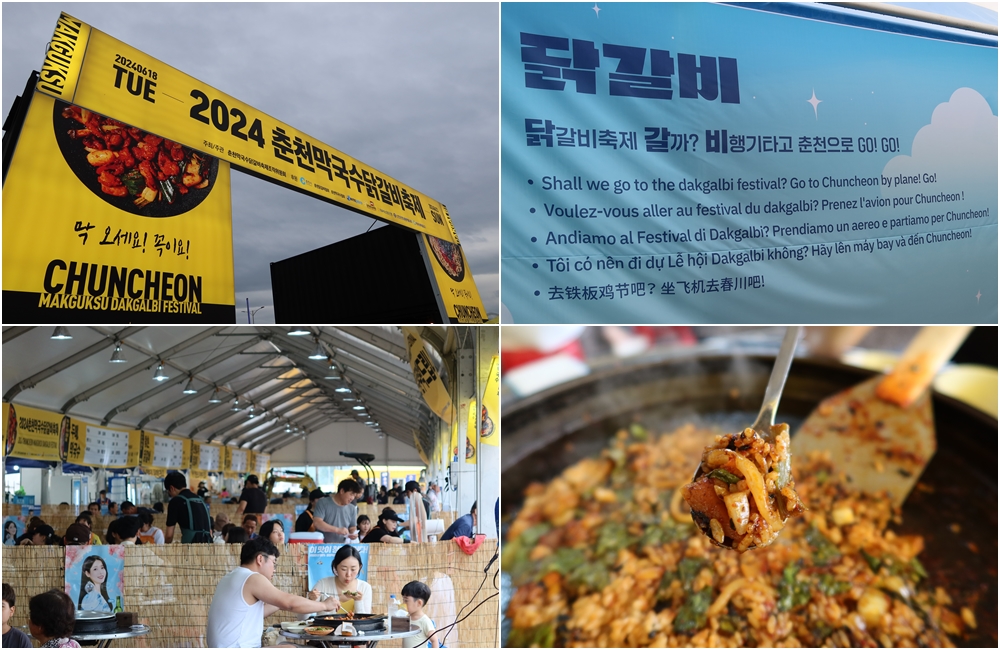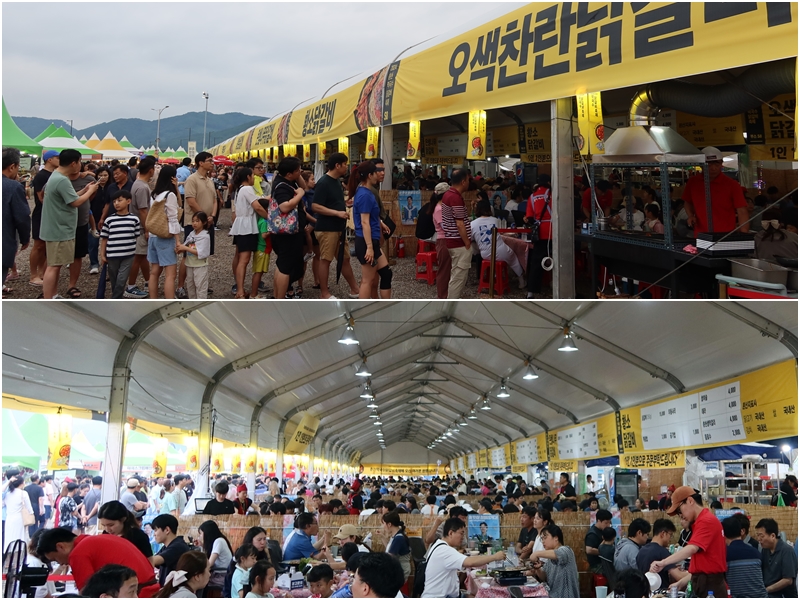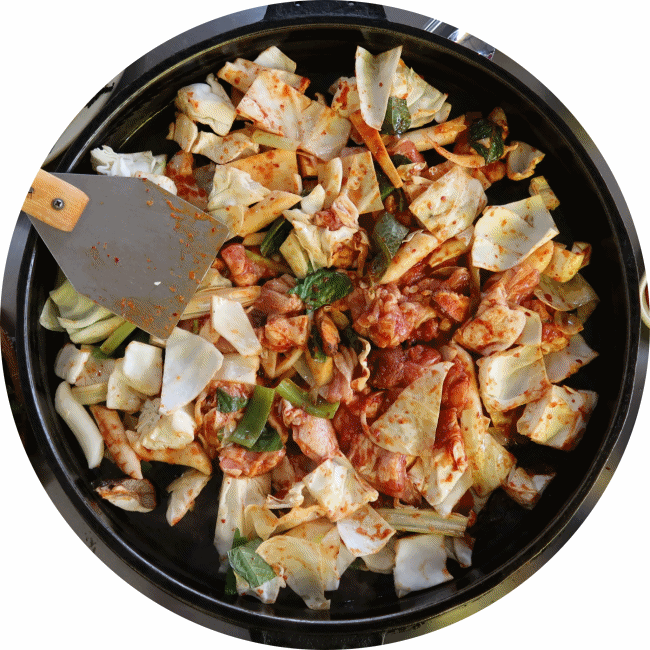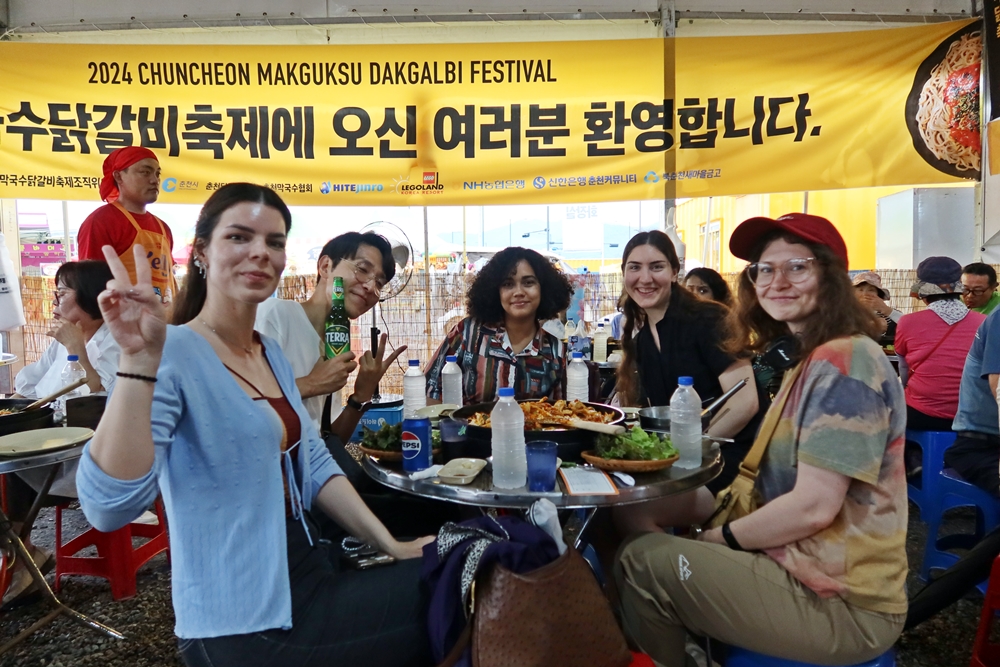
This year's Chuncheon Makguksu & Dakgalbi Festival ran from June 18-23 in Chuncheon, Gangwon-do Province.
By Charles Audouin
Photos = Charles Audouin
Young couples and families on June 22 flocked to this year's Chuncheon Makguksu & Dakgalbi (Buckwheat Noodle and Chicken Barbecue) Festival. The crowded venue was the parking lot of Legoland Korea Resort on Hajungdo Island in Chuncheon, Gangwon-do Province.
The annual festival attracts both domestic and international tourists each summer seeking the city's signature dishes dakgalbi, or spicy stir-fried chicken barbecue, and makguksu, or cold buckwheat noodles with sauce that represents Gangwon-do.
The original event started in 1996 as a makguksu festival, but was merged with the dakgalbi event. Thus this edition marks the 28th anniversary of the unified gala.

Dakgalbi vendors at this year's Chuncheon Makguksu & Dakgalbi Festival served customers from 10 a.m. to 10 p.m. As night approached, the lines in front of the eateries grew longer.
After getting off the shuttle bus between Chuncheon Station and the festival venue, the enticing aroma of spicy chicken covered the air. The scent led to an outdoor food court, which had eight outdoor dakgalbi vendors eager to serve.
Six of the vendors focused on dakgalbi and offered identical menus and prices. One of the other two remaining offered Gangwon-do specialties like makguksu, pyeonyuk (thinly sliced meat) and muksabal, or a jelly-like dish made of grains, beans or nut starch, and the other charcoal grilled dakgalbi.
Disappointingly, not all restaurants served the buckwheat noodles but the menus were released in advance on the festival's official website.
Ordering was straightforward. Customers just requested their desired number of dakgalbi servings and add-ons like udong noodles and fried or plain rice. This simplicity catered to indecisive diners.
After a while, staff promptly delivered the ingredients and began stir-frying the chicken ribs. As the vibrant meat dressed in sauce was cooked on an iron grill, a mouthwateringly savory aroma filled the air to create a fiery spot in a culinary heaven.
After a 10-minute wait, the dish arrived and offered a symphony of flavors in its sweet and spicy marinade: tender chicken, chewy rice cake and crispy vegetables. No wonder that dakgalbi secured the No. 2 spot on the prestigious Taste Atlas list of the World's 50 Best Stir-Fried Dishes.

Dakgalbi is made with chicken, sweet potatoes, rice cake, cabbage, onions, sesame leaves and green onions and stir-fried on an iron pan with a marinade, using a spatula to mix. After eating, the leftovers are stir-fried with rice, onions, lettuce and seaweed in sesame oil.
The Encyclopedia of Korean Folk Culture explains why makguksu and dakgalbi are emblematic of Chuncheon.
In the late 1960s, dakbulgogi, or grilled chicken marinated in seasoning instead of pork that is grilled over charcoal, evolved from a snack eaten with alcoholic beverages to its present form. By the 1970s, dakgalbi restaurants proliferated in the back alleys of the Myeong-dong neighborhood of downtown Chuncheon, as the food grew famous as a cheap and filling meal for soldiers on leave and university students.
Makguksu was a favorite during the reign of Joseon Dynasty King Injo following the Imjin Waeran, or a series of Japanese invasions of Korea in the late 16th century. It is said to be especially popular among Chuncheon residents on long winter nights.

Foreign visitors on June 22 eat dakgalbi at this year's Chuncheon Makguksu & Dakgalbi Festival in Chuncheon, Gangwon-do Province.
This year's festival featured programs over six days including a fast dakgalbi eating contest, makguksu eating competition, drone light show and celebratory performances.
The following are the ratings of the festival by Korea.net reporters.
| Category | Stars (maximun 5) | Assessment by Korea.net staff writer |
| Atmosphere | ★★★★★ | Provincial specialty festivals in Korea primarily focus on food, but many visitors also go for related programs. The Chuncheon Makguksu & Dakgalbi Festival features performances, drone shows and other experiences. |
| Taste | ★★★★★ | Can the dishes really be bad when eaten in Gangwon-do, where they originated? |
| Accessibility | ★★★★ | Going to Chuncheon takes less than 90 minutes from Seoul by public transportation such as train or bus. The plethora of shuttle buses from Chuncheon Station to the venue make it very accessible. |
| Convenience for foreign visitors |
★★★ | There's no language barrier when it comes to dishes, but the festival had no guides in foreign languages. But navigating is manageable with a basic command of Korean. |
*How to fully enjoy the Chuncheon Makguksu & Dakgalbi Festival
- Specialty festivals in the provinces such as this one are best enjoyed with a group of people. Visiting at dusk is also best for soaking in the atmosphere.
- Dakgalbi can be spicy, but the level of spiciness can be adjusted. Just ask that less seasoning sauce be used when ordering.
caudouin@korea.kr
![[Korean food festival ①] Addictive flavor: Tteokbokki Festival in Daegu](/upload/content/image/a21fb60d60464598833f6fbc70adc32b_20240529165815.JPG)